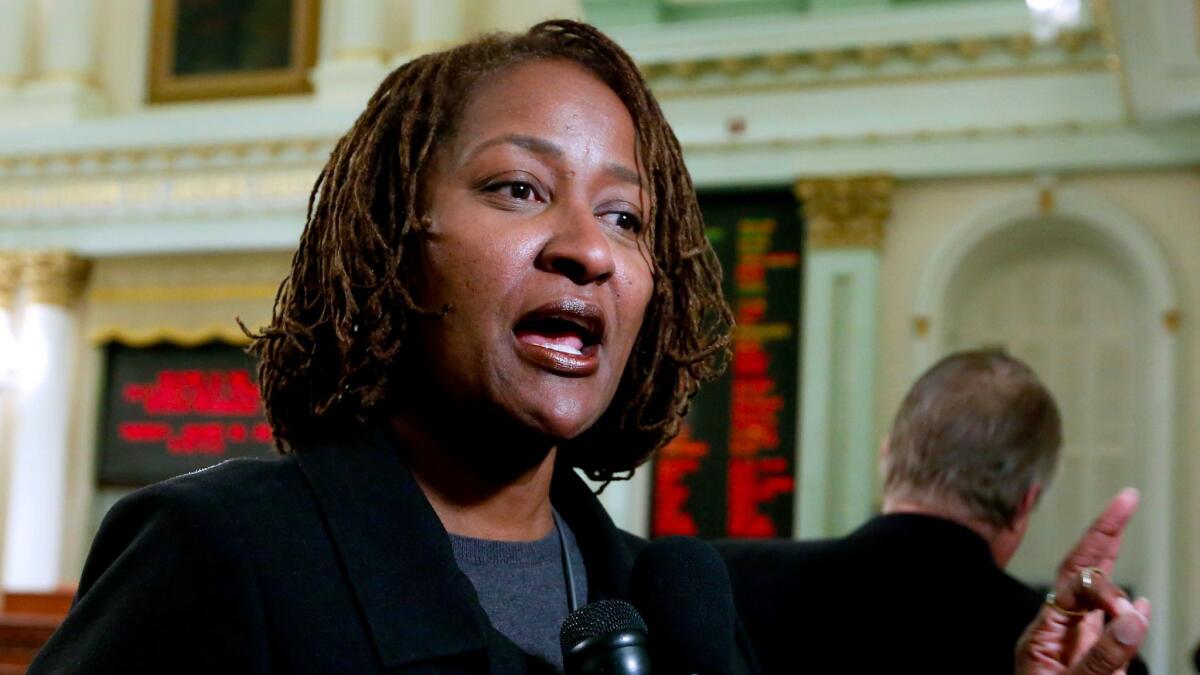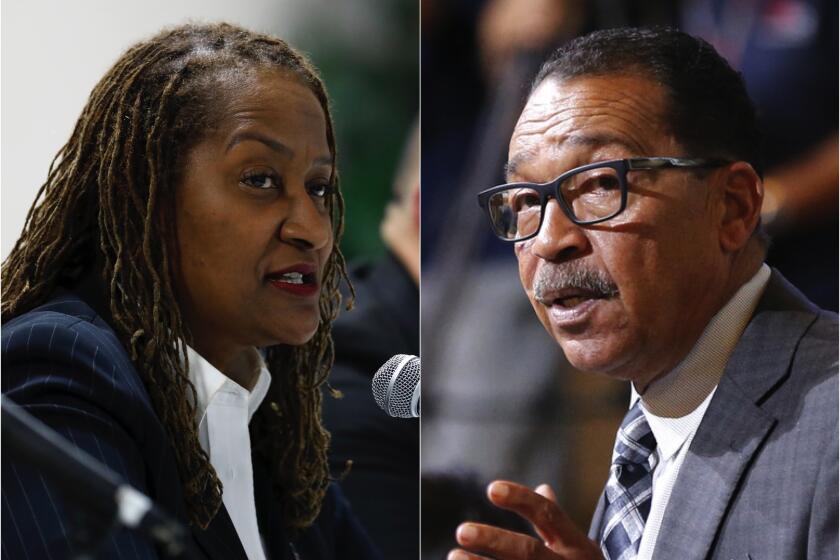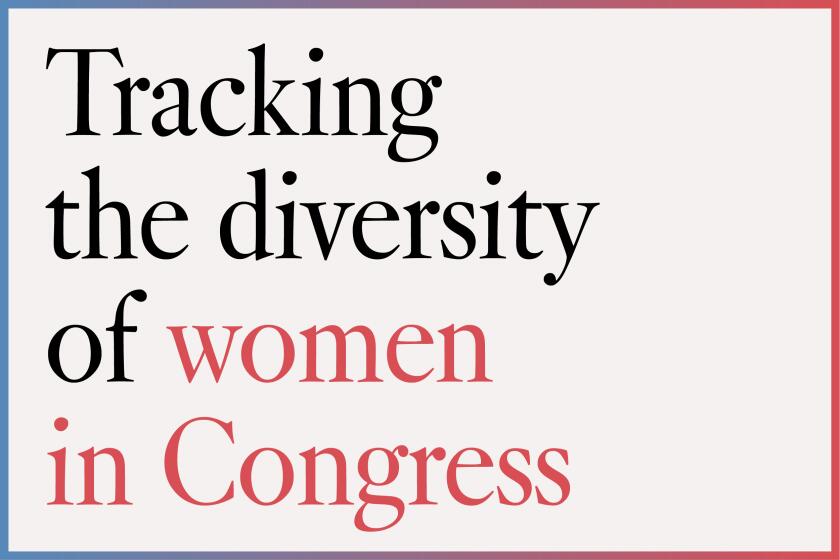L.A. County makes history with all female Board of Supervisors

- Share via
Nicknamed the “five little kings,” the men who ruled the Los Angeles County Board of Supervisors for more than a century enjoyed massive power and the perks of a coveted job they kept for decades.
Those days are over.
On Wednesday, history was made when state Sen. Holly Mitchell won the board’s 2nd District race by a wide margin against L.A. City Councilman Herb Wesson, who was termed out from his seat.
For the first time since the board’s inception more than 150 years ago, the powerful Board of Supervisors will consist of all women, each of whom comes with significant backgrounds in politics and government.
“I can’t think of another example in the entire United States where you will have five women having control of ... the largest county in the entire country just in terms of people, but also the largest county budget in the entire country,” said Ange-Marie Hancock Alfaro, a professor and chair of gender studies at USC.
Mitchell, who grew up in Los Angeles, said she couldn’t have imagined when she started working for then-state Sen. Diane Watson in her early 20s that she’d end up making history on the Board of Supervisors.
For years, Mitchell saw herself as a “great No. 2,” never feeling confident enough to run for office, even when Supervisor Sheila Kuehl, then a state lawmaker, encouraged her to run for Watson’s seat when it opened.
That changed when Mitchell, then chief executive of the children and family services organization Crystal Stairs, was sitting in a health and human services subcommittee hearing and watched three male lawmakers, without much thought or input from the large crowd of advocates and constituents, cut $1 billion from state subsidized childcare. While venting to then-Assemblywoman Karen Bass, she had an epiphany.
“I literally said in my mind, ‘I guess I have to run,’ ” Mitchell said.
The L.A. County Board of Supervisors is considered the most powerful local governmental body in the country. It’s often overlooked by residents, who generally do not know who their supervisor is. The board oversees the county’s $35-billion budget — and the largest jail system in the country and one of the largest public health infrastructures — and has significant power over how those dollars are spent.
“Many people consider local government at the bottom of the hierarchy of power, unless you’re referring to a mayor of a major city,” former U.S. Rep. Yvonne Brathwaite Burke, the first woman appointed to the board in 1979, said in a 1988 opinion piece for The Times. “The truth is that few, if any, offices in California carry the quiet power that is enjoyed by a member of the Los Angeles County Board of Supervisors.”
As departing Los Angeles County Supervisor Gloria Molina was being honored last week for her 23 years in the office, she paused to reminisce about her rocky beginning.
Former Supervisor Gloria Molina, the first Latina elected to the board, said that when she joined in 1991, it was a challenging environment fraught with sexism and subtle racism.
Once, when she challenged a choice her fellow supervisors were making and asked for the parliamentarian rule on it, a male supervisor told the media that Molina was upset because she was “having hot flashes.”
While Molina was in office, a neighboring county had a supermajority of women on its Board of Supervisors.
“And I used to say, ‘Oh, how wonderful it would be if L.A. County had that same option,’ ” she said.
Political scientists say part of what’s helped get more women elected is rejecting the notion to “wait your turn,” a long uttered statement by incumbent politicians who feel they get to decide who their successor will be and when.
“I’ve never fathomed the notion that you’re supposed to wait until someone gives you permission to run for office,” said Raphael Sonenshein, executive director of the Pat Brown Institute at Cal State L.A. “By the time it happens, it could be 20 years, and you may have lost your steam, or you may not have the energy for it, or you’ve gotten discouraged.”
Mitchell said she has been told to wait her turn, and “in no uncertain terms,” in the supervisor race.
The belief among some was that she should allow Wesson to take the seat because he had to vacate his City Council position because of term limits, she said, and she had two more years in her state Senate seat.
For the first time in its history, the Board of Supervisors will be made up of all women. Measure J, which would increase funds for social services, also appeared to pass.
“There is this notion of who has paid their dues, and my comment back has consistently been that elections aren’t popularity contests,” Mitchell said.
One of the most well-known supervisors in county history is Supervisor Janice Hahn’s father, Kenneth Hahn, who held the 2nd District seat for 40 years.
Janice Hahn said she was born shortly before her father took office and grew up seeing a much different county culture than that reflected in her own office. Her father had an all-female administrative support staff, “the girls in the front office,” for whom her mother bought gifts every Christmas.
“Even in my own family, my father probably saw my brother as the one to go into public office, and he probably assumed I would get married and raise kids,” said Hahn, who has also served on the L.A. City Council and in U.S. House of Representatives.
Hahn said she hopes the novelty of having five women on the board wears off — but she’d like to celebrate it for at least a bit longer.
“We’ve once again broken a glass ceiling right here in Los Angeles County,” she said.
Long live the queens.
More to Read
Sign up for Essential California
The most important California stories and recommendations in your inbox every morning.
You may occasionally receive promotional content from the Los Angeles Times.















